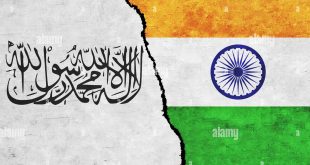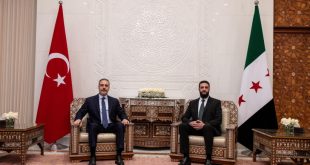About this Feature Story: The United Nations has a mandate to support the Government of Afghanistan and its citizens in a shared goal of becoming a stable, open, and peaceful nation. The following news feature is meant to tell a human interest story related to how Afghanistan and the UN are working together to overcome the many challenges to achieving this goal.
DAIKUNDI, Afghanistan: After two years working as a journalist in a deeply challenging environment, Insia Najafi, in her sparkling blue camouflage scarf and wide smile, is pretty sure what keeps her going as a radio reporter and talk show host. One day she discovered a family wandering the back alleys of her city with a child who had passed away during the family’s hasty flight from fighting in southern Afghanistan.
“They had no idea what to do with their baby,” Insia says now. “They had taken the child to the hospital and the authorities had sent them away. I guided them back and showed them how to ask for shelter. What I’ve seen here since has been a change in attitudes, moving towards a greater local acceptance of displaced persons.”
Daikundi province sits in the highland heart of Central Afghanistan. Beset with an arid climate best for apple and nut orchards, the capital city, Nili, it is surrounded to the south, west and east by war. Though calm by comparison to other embattled Afghan provinces, Daikundi is impoverished and teaming with social and health problems, including malnutrition. The dominant Hazara ethnic group, however, actively promotes women’s participation, including in media, which adds to a surprising national trend in Afghanistan.
Through gritty determination, ambition, and hard work, Afghan women across the country have increased their presence working in media by 12 percent this past year despite ongoing security threats and documented instances of harassment, according to the group NAI Supporting Open Media. Even with the 12 percent rise, only 17 percent of all journalists in Afghanistan are women, but the trends are encouraging say national journalist unions and leading editors, adding that high-profile jobs for women in journalism provide a “role model” for other Afghan women with working ambitions.
Insia, 23, is an example of the motivation of young Afghan women seeking work in the profession. She began work two years ago with a three month old child of her own and help from her family. “I had the support I needed – including from my husband,” she says. “When I’m out in the field women also feel free to talk to me and highlight their own struggles.”
The world of journalism has turned upside down for Afghan women in just the last sixteen years. Until 2001, under the Taliban, even the idea of a media encouraging an open society was nonexistent. Women were forced to remain inside, and even whipped for seeking an education. “Everything after 2002 was entirely new for Afghan women in journalism,” says Torpekai Amarkhel, a seasoned producer with the United Nations Assistance Mission in Afghanistan’s public affairs section, and who works with female radio teams across the country.
The UN Mission in Afghanistan includes support for local radio stations, including in Nili, and education about the public’s access to information through media, which the UN considers a bulwark of an open society. “For now, the number of women working in media might have increased, but there are still many obstacles,” said Amarkhel. “I work with teams in the field now, who arrive to work in burqas [head to toe veils] and conduct their interviews through burqas, particularly if they are outside of the office. It is still not easy to convince women that this is a great or even comfortable profession for them.”
Even in the capital Kabul, there is still a high amount harassment, often sexual in nature. “We have received so many complaints of sexual harassment,” says Makia Monir, who helps to document such cases for the Journalist Association of South Asia. “We actually sometimes don’t publish reports showing heavy harassment because we don’t want to frighten woman away from the profession.”
Yet women have a long history in Afghan journalism and have been working in the profession for over a century, according to Najeeba Ayobi, who is the Managing Director at Killid Radio, a national network of stations that has been a leader in promoting women’s participation in the media. “Nearly a century ago when the Her Royal Highness Queen Suraya visited Europe, she returned with the idea to start a new publication focused on women’s issues,” she said. “Topics included issues of working at home as well as biographies of leading ladies.”
Later, under King Zahir Shah in the 50s and 60s, women began to work more openly in media as reporters, editors and also as TV presenters. Still, media remained what Mrs. Ayobi now calls “still a patriarchal profession,” dominated by men. Despite the hardships, Mrs. Ayobi notes the allure of working as a journalist is still strong, particularly for young Afghan women wanting to make a difference. “It holds forth the possibility of fame, if not fortune,” she says.
Yet, here in dusty Daikundi, which is not on the list of stopovers for diplomats or even aid workers, there is little evidence that the allure of journalism holds forth the hope of fame here in dusty Daikundi. Several female reporters said they regularly are spoken down to by men in an abusive manner and have difficulties setting up interviews.
Masooma Seerat, 24, began her tenure at Radio Nili with almost no support from her peers and no encouragement from her own family. “When I started here, people in my village were talking behind my back,” she said. “They asked, ‘Why is she doing this?’ I had arguments with my Mom and spoke to my Dad and he was also against it, but finally he allowed it.”
For Masooma, the inspiration to work was similar in some respects to that of her colleague, Insia. It was her “big story” – the one that helped her recognize the essential value of serious journalism.
“It was about two elderly sisters living together in a tiny room and holding on by a thread to their own lives,” she said. “I went to visit them. People thought they would not make it through the winter – that they would freeze to death — but after my story about them I had both a businessman, who wanted to help, and the Department of Women’s Affairs on the phone asking about them. That story really changed my outlook on the impact I could make, and now, all the talk of ‘why’ I would work as a journalist in by own neighborhood has ended.”
Writer:
Philip Smucker | Senior Writer & Media Analyst | UN Assistance Mission in Afghanistan (UNAMA)
Mobile: +93 708 210 994 | Telephone: +1 212 963 2668 ext. 6240 (via NYK)
Email: [email protected]
 Afghanistan Times
Afghanistan Times




